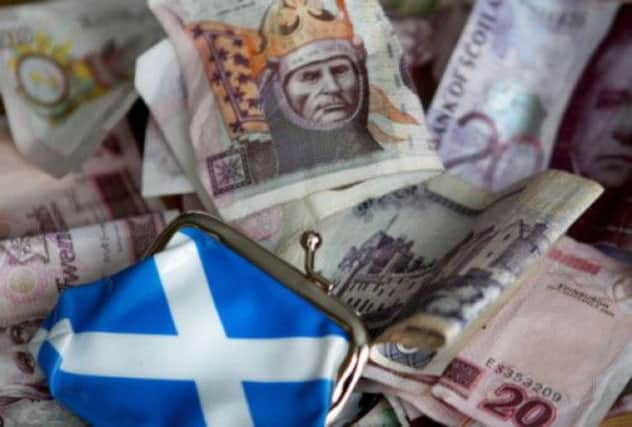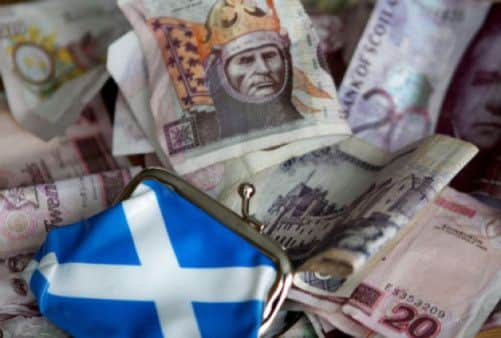Currency at heart of white paper debate


Unionist politicians said the SNP’s plan for a sterling union was unworkable. But nationalist leaders insisted retaining the pound would benefit both the Scottish and UK economies.
Deputy First Minister Nicola Sturgeon said that as Scotland represented the second biggest export market for the rest of the UK after the United States, it would not be in Westminster’s interests “to force its businesses into a separate currency” when Scotland wanted to retain the pound.
Advertisement
Hide AdAdvertisement
Hide AdBut Scottish Secretary Alistair Carmichael said such a currency union “wouldn’t work” and would give Scotland less control over interest rates – even if the rest of the UK agreed.


Former chancellor Alistair Darling, the leader of the pro-union Better Together campaign, stepped into the row, saying the SNP’s plans to keep the pound looked like a “non-starter”.
The Scottish Government will tomorrow unveil its blueprint for independence, and First Minister Alex Salmond said the economic case for independence would be the centrepiece.
But Mr Darling said the SNP had to set out alternative plans for a currency if the UK refused to share sterling with an independent Scotland. And he raised the spectre of Scotland joining the euro.
“One of the questions which is absolutely critical is which currency will we use,” he said. “They say that they are going to enter into a currency union with the rest of the UK. That requires two things: firstly, agreement from the other side, and secondly, agreement to the terms and conditions as we see in the eurozone, for example.
“It’s increasingly obvious that this currency union is beginning to look like a non-starter so if that’s the case, what is plan B? Are we going to join the euro, are we going to have our own currency or are we going to use sterling in the same way as Panama or Ecuador use the US dollar?
“We need to know the answers to these things. It is not being negative, it is simply asking the nationalists to come clean as to what their true plans are.”
However, Ms Sturgeon said she was “exceptionally confident” about the Scottish Government’s plans, which she said would be set out in detail in the white paper.
Advertisement
Hide AdAdvertisement
Hide AdShe insisted a currency union would be in the best interests of Scotland and the rest of the UK, and said: “We want to be in, and believe we will be part of, a shared currency.
“Let me give you the three reasons why I am exceptionally confident about the position around a shared currency.
“Firstly, Scotland’s is the second biggest export market for the rest of the UK after the United States of America. It would not be in the interests of a Westminster government to force its businesses into a separate currency when Scotland doesn’t want to be in a separate currency.
“Secondly, our exports – oil, gas, whisky – make a substantial contribution to the UK’s balance of payments. They will not want to lose that.
“Thirdly, this issue about assets and liabilities has to be taken as two sides of the same coin. The pound is as much Scotland’s as it is the rest of the UK’s. If the UK government wants Scotland to take responsibility for a share of its debt, then it also has to accept the sharing of assets as well.”
Mr Carmichael’s remarks that a sterling currency union “wouldn’t work” under independence followed comments he made last week that Scotland would not be allowed to use the pound if it voted to leave the UK next year.
The Scottish Secretary’s latest intervention came days after the Welsh First Minister, Carwyn Jones, said he was not convinced the Scottish Government’s ambition for a shared currency if Scotland voted Yes in next year’s referendum would work.
Mr Carmichael said: “Public international law is very clear on this, that if you remove yourself from the United Kingdom then you would remove yourself from all sorts of institutions and, yes, the pound would be one of them.
Advertisement
Hide AdAdvertisement
Hide Ad“The fact is that a currency union wouldn’t work. It wouldn’t work for Scotland, it wouldn’t work for the rest of the United Kingdom. If you look at what happens in the eurozone, and you learn in fact that the currency union there runs into difficulty because it doesn’t have the fiscal, the economic or the political integration.”
The Scottish Secretary added: “Independence is about political disintegration, it’s not about integration.”
The SNP insists the white paper will answer critical questions on pensions, defence and the currency of an independent Scotland.
Mr Salmond, speaking 24 hours ahead of the its launch, said a job creation plan would be a key plank of the document.
The First Minister said the white paper would spell out in more detail how an SNP government would fulfil a pledge to create tens of thousands of jobs in an independent Scotland.
He claimed independence would lead to important boosts in growth, allowing Scotland to massively increase employment, after he launched a paper last week on the economic case for leaving the UK.
He said: “We are setting out a positive plan for job opportunities and economic growth based on Scotland’s vast natural resources, key growth sectors and human talent.
“The Scottish Government is setting out plans for the future, and, from Tuesday, we will seek to engage the whole Scottish population in a debate about how to build a better Scotland.”
SEE ALSO: